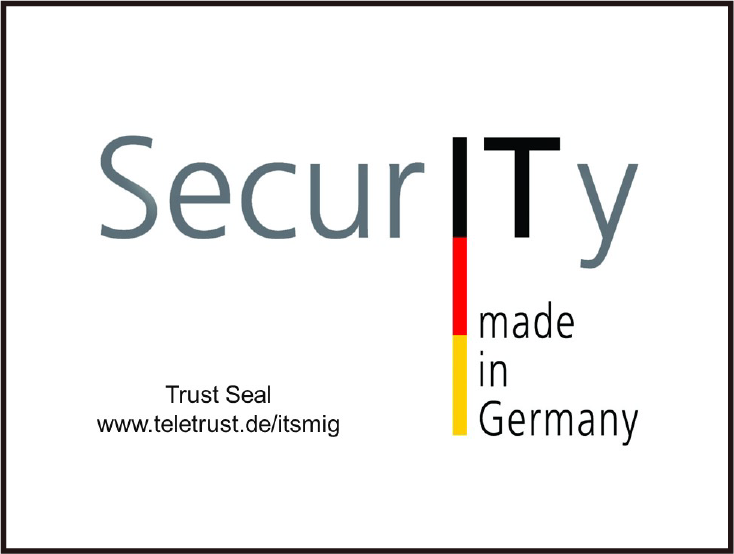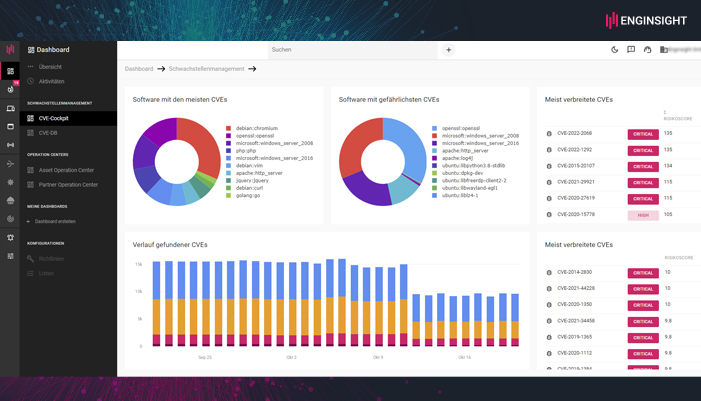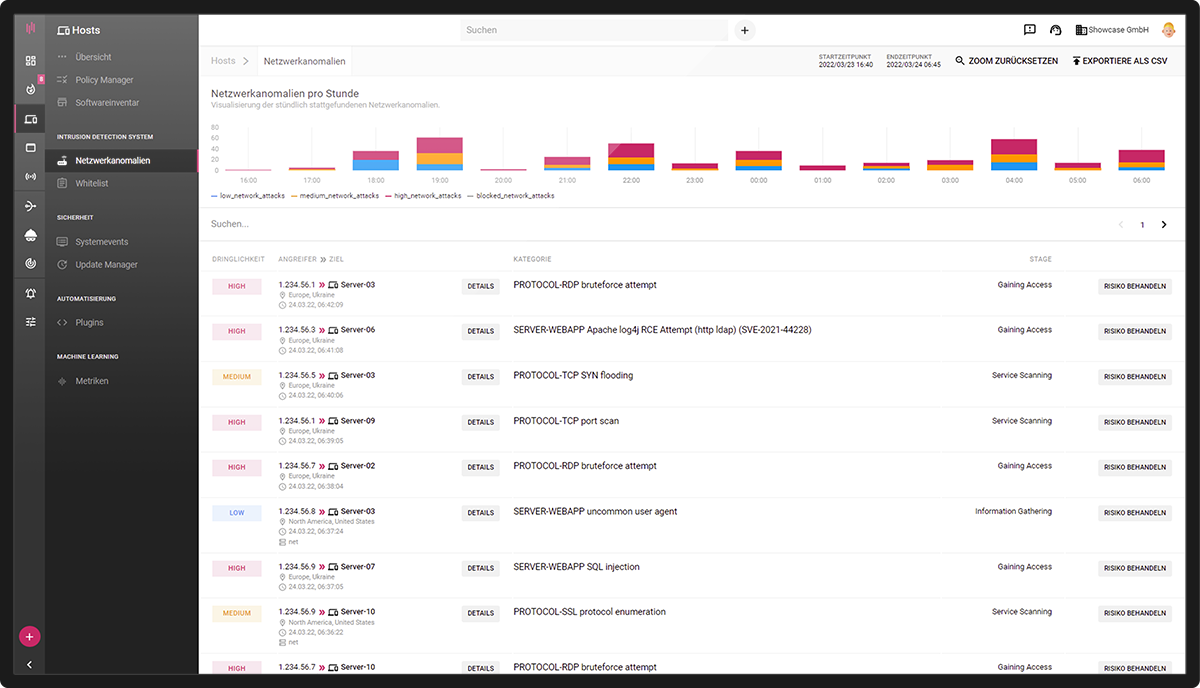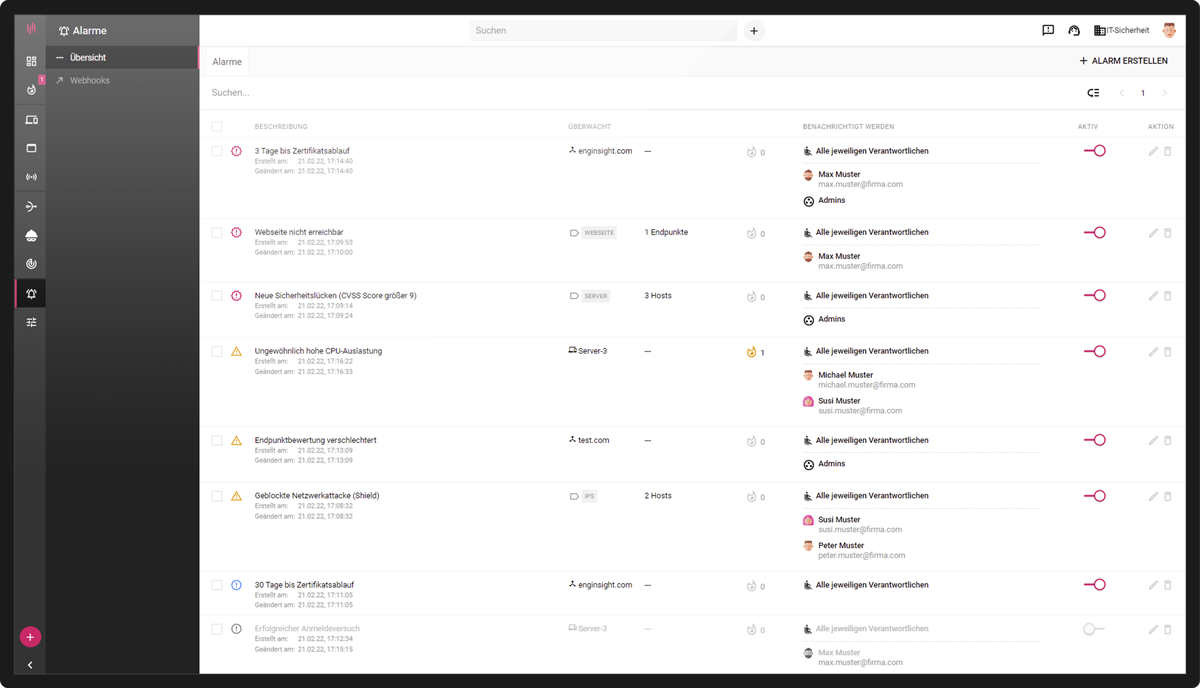 More control. More security.
More control. More security.
IT-Security for public institutions & administrations
Acting instead of waiting!
With Enginsight you secure public institutions and administrations efficiently and easily against cyber attacks
and constantly optimize the security state of your IT, almost resource-free and guaranteed not process-heavy.

“By means of asset recording and the partially automated pentests, we receive everything we need in a readable format to assess system risks and initiate targeted measures. In addition to security events, software agents can also be used to monitor availability and performance. The monitoring of self-operated web applications and automated checks according to BSI round off this solution wonderfully for us.”
Oliver Hermann, Head of IuK Department of the City of Ettlingen









Information and cyber security for the good of society
The threat situation in the area of IT security is increasing worldwide and is also increasingly affecting public institutions and administrations. Fast and effective protection of IT systems is urgently needed. However, administrations often face additional hurdles that make it difficult to ensure IT security adequately.
PROCESSES. Personnel. Budget.
The uncertainty is great. Staffing levels are tight. The rules for awarding contracts are strict. The question of when specific requirements for IT security measures will be defined and security budgets allocated remains open. The Digital Pact is not taking effect; it remains to be seen whether this will change with Digital Pact 2.0.
ATTACKS NON-STOP
As a security officer, you can’t wait for your facility to be attacked. Hackers don’t hesitate; they strike whenever and wherever they find vulnerabilities. Therefore: Act before something happens.
THE SIMPLEST AND MOST EFFICIENT SOLUTION
The combination of an advanced, technical security solution and the know-how of experts who know what to do (even if something happens), you will succeed in the all-embracing protection of your IT systems and data.
IT SECURITY FOR SCHOOLS AT ZERO COST
Unfortunately, targeted cyber attacks are increasingly hitting schools. Unfortunately, due to a lack of budgets and specialists, they often have poorer conditions to adequately protect themselves. This is now a thing of the past!
We provide free Enginsight licenses for schools running on an on-premises instance of the connected main administration (city/municipality/county), provided that the administration’s infrastructure is secured with Enginsight.
For all information and general conditions, please refer to the offer flyer. And if you have any questions, we will be happy to help you personally.
All-in-one Security One platform, many possibilities
Enginsight is incomparable – in terms of integrated features, in terms of usability, in terms of integration possibilities …. Discover and be amazed: the following is an excerpt of the versatile possibilities that help you to secure yourself in the best possible way.
What are the most critical entry points in your IT environment? With Enginsight, you can get an overview by criticality and receive direct recommendations for action.
- Identification of specific weaknesses in your IT
- Risk assessment according to severity
- Fixing vulnerabilities automatically or manually
- Monitoring the success of the security measures
Detect and block cyberattacks on your IT infrastructure – Enginsight makes it easy. With just a few clicks, you can use Enginsight to detect and stop attacks from both inside and outside your organization.
- Stop attacks from the internal and external networks
- Host-based intrusion detection and prevention system (IDS/IPS)
- Homeoffice-ready
Always keep an eye on everything to identify bottlenecks and risks at an early stage. Das verbessert nicht nur die Work-Life-Balance der IT-Abteilung, sondern hilft auch beim Erhalt und Erreichen von Zertifizierungen und rechtlichen Vorgaben, z. B. die ISO 27001.
- Inventory IT assets automatically
- Detect deviations and problems at an early stage
- Powerful alerts
Would you like to be in the press? No? Well then ...
The German Federal Office for Information Security reports that criminals attacked Internet sites of eight German states this week.
The websites of the city of Kaltennordheim and the administrative community Hohe Rhön are offline due to a cyber attack, in which unknown persons have tapped access data and changed content. In response to the attack, the pages have been blocked and plans are being made to increase security standards.
The state government plans to strengthen information security at universities and is providing additional funding for this purpose, but the ultimate responsibility for the security and integrity of IT systems rests with the universities themselves.
Following a hacker attack on the Lower Saxony police, some servers and the agency's homepage were unavailable for hours on April 4. However, the police's internal IT systems and data were not compromised, and the State Criminal Police Office has begun an investigation.
On 09.07.2021, the Anhalt-Bitterfeld district declared a disaster emergency for the first time in Germany due to a serious cyber attack. The Trojan-related attack crippled the IT infrastructure, affected the payment of social and maintenance benefits for at least a week, and led to the loss of data, including a large environmental database.
Following warnings from security authorities of an imminent hacker attack, Potsdam's city administration has disconnected its Internet connections, leading to restrictions in citizen services. The IT systems are to be gradually brought back up in the coming week after extensive security tests have been carried out and further precautions have been taken in coordination with the security authorities.
The state authorities of Saxony-Anhalt were hit by a hacker attack, which made their websites unavailable for several hours. However, according to Digital Minister Lydia Hüskens, no damage was caused and the attacks on official websites in various German states, including Brandenburg, Thuringia and Lower Saxony, are considered coordinated.
In 2022, 28 cyber attacks were recorded against ministries, state companies, authorities and schools in North Rhine-Westphalia, with only one attack having a major impact. According to the government, the number of attacks did not rise sharply after the outbreak of the Ukraine war, and so far there are no known serious cybersecurity incidents directly related to the Ukraine war in North Rhine-Westphalia.
Faster. Safe. Resource-efficient.
Come to the safe side and let us together make your administration or public institution a bit safer.





